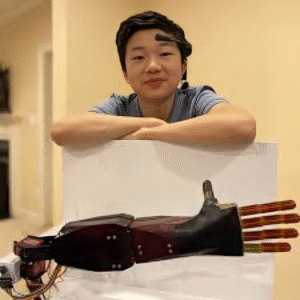A Fresh Perspective on Accessible Prosthetics
Meet Benjamin Choi, a high school senior from Virginia who used his spare pandemic time to reimagine prosthetic technology. Inspired by a childhood memory of a 60 Minutes segment on brain-implanted prosthetics, Choi set out to design a less invasive, affordable alternative—and succeeded.

Key Highlights
- Non-invasive brain sensing: Utilizes just two electrodes—one on the forehead and one on the earlobe—to capture brain signals via EEG.
- AI-powered control: An algorithm, trained using data from volunteers, converts brainwave patterns into precise arm movements.
- High-tech depth: The entire system encompasses nearly 900 pages of calculus, more than 23,000 lines of code, and multiple sub-algorithms embedded on a compact chip .
- Benchmark performance: Comparable in function to commercial prosthetics priced at $450,000+, yet Choi’s creation costs less than $300 to produce .
- Recognition earned: The project was a finalist in the prestigious Regeneron Science Talent Search
Why It Matters
- Scalability & affordability: Around 2 million people in the U.S. face limb loss each year, but access to advanced prosthetics remains limited due to high costs. Choi’s project opens a new path forward.
- Empowering autonomy: Built in his basement, Choi’s DIY ingenuity highlights how AI can democratize medical tech.
- Community buzz: The project has sparked genuine admiration online, with people impressed by its disruptive potential
Final Thought
Benjamin Choi’s work redefines what’s possible when AI meets compassion and creativity. This isn’t just engineering—it’s a beacon of inclusive innovation.
What recent AI breakthrough inspired you? Let me know what caught your attention!



